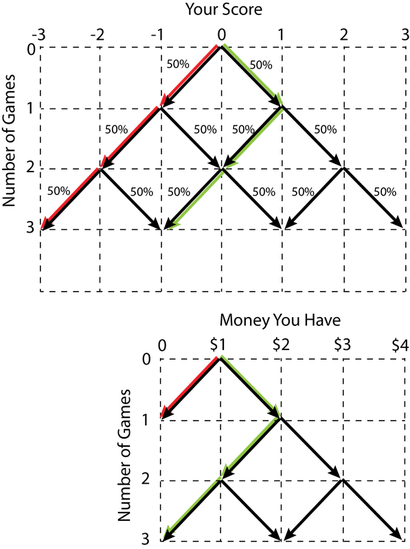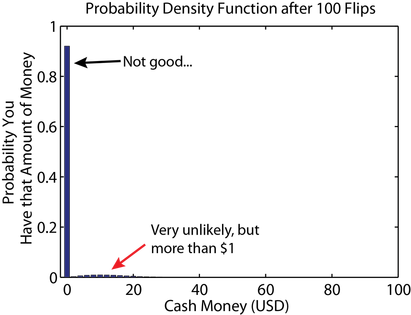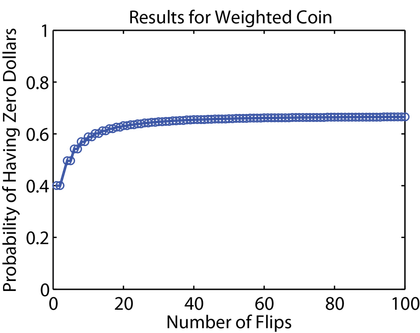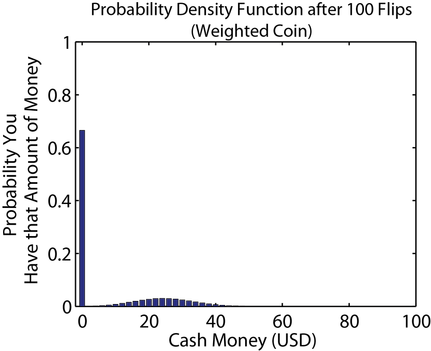WHY NOT TO PLAY A FAIR CASINO GAME
My friend Alex studies Math and asks me interesting questions that we work out together. Here's an example. Suppose you play a coin flipping game. If you get a heads you get one point, and if you get a tails you lose a point. Because there is equal probability of getting a heads or a tails, you can imagine that your score after many flips will on average be zero. A nice way to imagine this (boring) game is to draw out a tree like this:
|
You start with zero points, and have a 50% chance of gaining a point (heads) and a 50% chance of losing a point (tails). The red path shows the worst outcome after playing three times (i.e. you get 3 tails in a row). The green path shows another outcome: getting a heads, tails, tails (H T T) and ending with -1 point.
To make this game more interesting, suppose that instead of points we are playing with money. Let's say you lose $1 if you get a tails and you gain $1 if you get a heads. There's one more rule: once you run out of money the game is over... You decide to visit a casino that is implementing this stimulating game, and give the game a shot. You play with $1. Applying the same reasoning of our first game, you may think that on average you end up with exactly what you started with (in this case $1). If this game does not bore you to death first, it will very likely end with you having zero dollars! After thinking about this problem with Alex, we were able to find some patterns in the outcome of the game. I wrote a computer program that let us see the probability of having zero dollars after playing a certain number of games. I think the results are really surprising. |
These graphs show that the more games you play, the higher the probability is that you will have zero dollars. After 100 games, there is a 92% probability that you have zero dollars. After 5000 games (not shown), there is a 99% probability you have nothing. This game is miserable! Interestingly, despite the very high probability that you end up with zero dollars, the expected value (the average amount of money you end up with) is one dollar! This is the case no matter how many times you play this lame casino game. 10 times. 100 times. 100000 times. The expected value is always $1. How bizarre. It's not a new idea though. Check out gambler's ruin.
I think it is pretty clear that you probably don't want to play this game because there is such a huge probability you lose and it is mind-numbingly boring. But would the casino want to offer it for people to play? Because the expected value is always $1, the casino will gain nothing in the end! Those few people who win big offset the majority that lose. I guess this game sucks for everyone except the lucky 1 % of people.
I think it is pretty clear that you probably don't want to play this game because there is such a huge probability you lose and it is mind-numbingly boring. But would the casino want to offer it for people to play? Because the expected value is always $1, the casino will gain nothing in the end! Those few people who win big offset the majority that lose. I guess this game sucks for everyone except the lucky 1 % of people.
But what if... we played with a weighted coin? Let's say that there is instead a 60% chance that you get heads. In other words, for each flip you have a 60% of getting one dollar. I know I would be much more willing to play that game. In this case, the probability of ending up with zero does NOT keep getting closer to 100%. Instead it plateaus at 66.67%. In this case, the expected value continues to increase the more you play the game.




